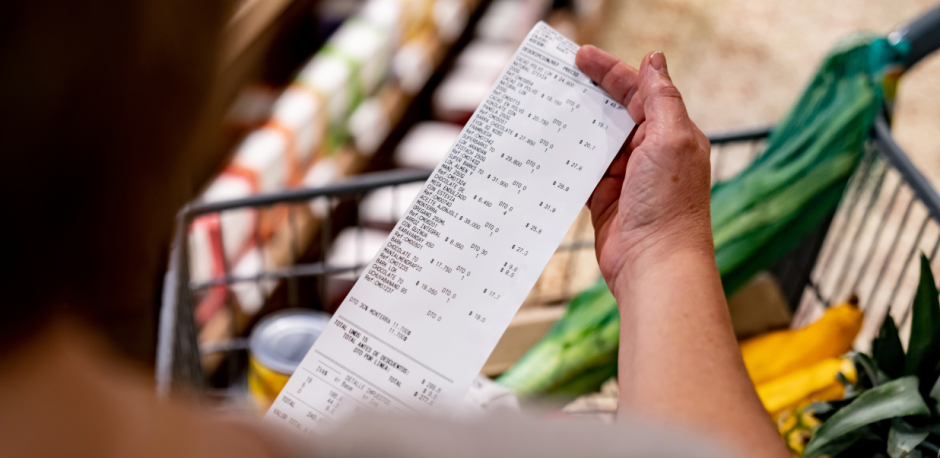Inflation measures how much the price for goods and services has gone up over time.
When there’s inflation in an economy, the value of money decreases because people would need to spend more to buy the same products. £1 would get you further this year than £1 would next year.
Prices rose by 11.1% in October 2022 – a 40-year high. But latest readings show inflation is falling. Prices rose by 3.2% in the 12 months to March 2024, the lowest rate since September 2021.
However, falling inflation doesn’t necessarily mean falling prices. It just means the rate of increase is slowing.
The spending power of your money will still be decreasing, just at a slower rate.
Here’s how it’s affected us over time.
This article isn’t personal advice. Investments can rise and fall in value, so you could get back less than you invest. If you’re not sure if an investment’s right for you, ask for financial advice.
What’s happened to prices?
Based on the consumer price index (CPI), goods and services in 2015 that cost £100 would’ve cost £133.03 in March 2024. That’s up by about a third.
Over a similar period, the average monthly rent in Great Britain at the start of 2015 was £918, this year it was £1,226. A similar increase.
Over that time, your money in a bank account has lost its spending power and buys less.
But not all things rise exactly with CPI.
A Glastonbury ticket in 2015 cost £225. This year it’s £360. That’s up over 60%. We’ll leave it up to your judgement over which has the better lineup.
Not everyone can get a ticket to Glastonbury though. So, it’s worth looking at more grounded purchases too.
In 2015 you could get a pint of milk for 45p in Sainsburys. Now it’s 90p. Double the cost over that time.
How can you beat inflation?
You can’t beat inflation by sticking cash under your mattress.
But you can make your money work harder for you.
If you have less than five years before you need the money, you could consider making sure that the interest rate you get on your cash is as high as possible.
One option to hone your hard-earned cash is our online savings platform, Active Savings.
There are a range of products and terms to choose from, offered by our banking partners and you can have as many as you like.
Remember though, even the best savings rates on the market might not keep pace with inflation. This means the purchasing power of your money could still be eroded.
But if you’ve got longer than five years, then you could consider investing.
Investing to beat inflation
Over 100 years, investments have outperformed cash for 91% of the 10-year periods. Of course, there’s never any guarantee with investing and past performance isn’t a guide to the future.
If you’re looking to get started, we’ve got lots of tools and resources to help you do just that.
This includes how the stock market works, how to build a diversified portfolio and how to monitor your investments going forward.
If choosing your own investments and building a portfolio sounds too much, it doesn’t have to be.
We’re launching four new low-cost all-in-one funds managed by HL experts.
You just have to pick one fund based on the level of risk you’re willing to take. And it’s the only investment you need.
The managers will then do the hard work for you, picking investments that track the market based on your chosen level of risk. They’ll manage it day-to-day, so you just need to check in on it every six months, or so to make sure it’s still right for you.
You can invest from just £100 as a lump sum or £25 as a monthly Direct Debit.
Invest by 11:59pm 5 June to get the fixed £1 per unit launch price.
HL Funds are managed by our sister company, Hargreaves Lansdown Fund Managers Ltd.
This website is issued by Hargreaves Lansdown Asset Management Limited (company number 1896481), which is authorised and regulated by the Financial Conduct Authority with firm reference 115248.
The Active Savings service is provided by Hargreaves Lansdown Savings Limited (company number 8355960). Hargreaves Lansdown Savings Limited is authorised and regulated by the Financial Conduct Authority (firm reference number 915119). Hargreaves Lansdown Savings Limited is authorised by the Financial Conduct Authority under the Electronic Money Regulations 2011 with firm reference 901007 for the issuing of electronic money.
Hargreaves Lansdown Asset Management Limited and Hargreaves Lansdown Savings Limited are subsidiaries of Hargreaves Lansdown plc (company number 2122142).


